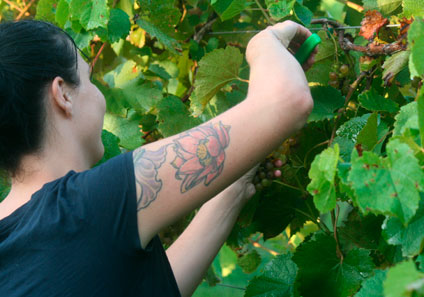From the fruit of the vine...
Grape harvest in progress at Ertel Cellars

MARY MATTINGLY PHOTO
Holly Eshelmur, Sunman, harvests grapes at Ertel Cellars Winery.
By Kerri Meyer
CONTRIBUTING WRITER
Remember when grandma and grandpa had grapevines in their backyard and would make homemade wine? It seemed simple, right? Well, multiply their few vines into 13 acres with just two tending the fruit of the vine. It’s not so simple, and actually a lot of hard work. Brian Ahaus knows because it’s what he does as head winemaker at Ertel Cellars Winery off of SR 129 in Ripley County.
In other words, this is not your grandma and grandpa’s homemade wine. It’s an intricate process, part art and part science.
While others in the state are raising corn and soybean, Tom Ertel of Batesville decided to go with fruit, and opened Ertel Cellars Winery in 2006. Today, the winery has 13 acres of grapevines that produce 20,000 gallons of wine a year, featured at Ertel’s restaurant on the grounds and sold across the state. Six acres are located off of 129, two acres that the restaurant overlooks and five acres in New Alsace.
The vineyards produce seven types of grapes: Vidal Blanc, Catawba, Chambourcin, Marechal Foch, Steuben, Traminette, and Vignoles. They will make 16 different wines.
“Winemaking is a dedication not a hobby,” said Ahaus. He has been in the wine industry for 23 years. He and his assistant Gary Ertel, tend the vines year round at Ertel Cellars. It’s their passion. While many may fall in love over a glass or two of wine, Ahaus said he fell in love with wine.
Winemaking, particularly at this level, is a rigorous process. Ahaus said, “It is definitely an year round process. There is always something to do.”
Winemaking starts Jan. 1 with the pruning process, which goes until April. Brian and Gary go out and hand prune each vine which essentially is taking 95 percent of the wood off the vine, cutting back buds and growth, and replacing any “arms” that have broken off the vines. They prune everyday until April unless it is raining. They can usually prune an acre a week. “Pruning is very critical and a lot of hard labor,” said Ertel. 
Bud break is around April 21 and after that point it’s hard to keep up with everything they have to do. The most important job after bud break is the cover sprays. “Without the cover sprays to protect the vines from contamination of fungus and mildew we will lose them all, you won’t have a grape left,” said Ahaus.
A drought like we had last summer actually is more fruitful than this summer’s cooler wet season. “This year has been a wet year and diseases have crushed 60 percent of Indiana’s vineyards because the rain will wash the sprays off…spraying the vines is the one thing people want to lack on,” said Ahaus. There are many other jobs that need to be done like mowing, maintenance work, lab work and bottling on top of everything else they have to do.
Prioritizing is key to the winemaker since it’s just he and Ertel doing the bulk of the work.
Currently at the winery it’s harvesting time. Harvesting is the picking of the grapes from the vines and essentially is the first step in the creating the wine. At this step timing is everything, and if something goes wrong during harvest, for example if they leave the grapes on the vine too long they could lose everything. So it is probably one of, if not the most crucial step, in the whole winemaking business.
Harvest is from August to October and the winery brings in about 20-30 people to help. Greg Laker has been working at harvest since it opened. He likes doing it, and makes his own wine as well. He said they can get three to six tons of grapes per acre. The workers start around 7 in the morning and last until about noon, mainly because of the heat. The next steps in the process are stemming and crushing, which is removing the grapes from the vine. Then the grapes go to the press and from there the juice is put in large tanks to ferment. After fermenting the wine is ready to be bottled, something the two men also do on site at the winery at least once a week.
KERRI MEYER PHOTO
Once harvest season is over Ahaus can then relax, not with a glass of wine, but with his bow and arrow as he likes to hunt, he said. Gary Ertel too takes a breather, and tries to check off a few items on his bucket list, but only for a week or two because they are back on the job preparing for the next harvest.
At county council meeting
Sheriff reports cash missing from office
Mary Mattingly
EDITOR
mmattingly@ripleynews.com
What may be a clerical error has resulted in a criminal investigation at the Ripley County Sheriff’s Office.
The State Board of Accounts is investigating the sheriff’s office for an outstanding cash balance. Money was reported missing from the cash box. The sheriff’s office believes it’s a clerical error but nonetheless is treating it as a crime scene.
Dave Pippin, chief deputy, informed the Ripley County Council about this at their monthly meeting Sept. 16. He explained how the cash box is kept in a locked cabinet and when the deputy matron went to access it, she did notice the locking mechanism was loose. She informed the sheriff and he then had her count the money. It was short $296. At that time, Sheriff Thomas Grills treated it like a crime scene, Pippin told the council. “He had the tech team come in to process for evidence,” Pippin added. The sheriff contacted the State Board of Accounts, and they advised they would investigate but not conduct an audit. Pippin said, “They also said we would have to go to council for the money. But the sheriff said he is in charge of the office and he’ll make the account balance and use from his own personal funds.”
The staff was asked to make sure all receipts were turned in. The cash box is used for petty cash, training purposes, transports, and other police business. There was still several hundred dollars left in the box. “It’s not confirmed if it’s clerical or criminal error…and until proven otherwise we are going on as criminal investigation. The sheriff will keep the council apprised of the investigation. I regret having to come to council with this,” Pippin told them.
State police were contacted and a lab analysis of DNA of staff who may have contact with the box was submitted. Pippin added his DNA was included. ”I don’t know what to think of it. Deputies and I met and we have worked together for 18 years..so anything is possible, but I truly believe it’s an odd amount, being $296. If someone would steal it, why not take all of it? That’s my opinion. “
Council members thanked him for sharing the information. Pippin added again he doesn’t think it’s a theft. “I live and work side by side with these people. I trust my life and children with these people, and I surely would trust these people with $300.” Since then, the sheriff has changed the location of the box and only one person has the key to access it.
On another matter, Pippin noted they will likely come next month for additional appropriations for vehicle repairs. He said most of their vehicles have around 170,000 miles and one has 200,000. They respond to 500 accidents a year on average. And they too deal with damage from accidents on the road, mentioning deer and vehicle collisions. “You have to drive fast and that’s hard on engines and transmissions. 170,000 (miles) is like 300,000 on a regular car.” The staff takes care of their vehicles and keeps a maintenance log, but nonetheless, the amount of driving can wear out a vehicle, he added.
Council member Ed Armbrecht asked about establishing a longevity ordinance for the sheriff’s office. They could not find one on the books. This would establish salary benefits or rewards for employees after so many years, and would not be subject to change. (The salary ordinance is voted on annually by council.) He said it would protect the staff. “A salary ordinance for deputies is a legal document, but there is less possibility of an ordinance being rescinded. You could vote against a salary ordinance,” Armbrecht said, noting a longevity rule protects the employees from council changes. Pippin agreed it’s more solid than a salary ordinance. Council would also want to know if there are any pending retirements as this helps with annual budget planning.
Pippin said the Merit Board meeting is Oct. 1 and he would then have a statement about any IRS retirement changes that could impact budgets.
Budget
The council adjourned in the beginning of the monthly meeting for a public hearing on the budget, as required, but no citizen attended. The council had met with department heads and others in August about fiscal needs. President Dephane Smith said later in the council meeting, “It was not an easy task. We didn’t get it down completely, but hopefully the state will say it is satisfactory.” She thinks the state will look upon it favorably since they have a reserve fund. The budget will be adopted at next month’s meeting and then submitted to the state.
The council also reviewed the submitted township budgets, an annual task. Any township, library, or school district that was at or under the 2.8 percent county growth income rate was not approved because the state does not allow it. The state growth rate is 2.6 percent. Approved: Adams Twp., Batesville Public Library, Brown Twp., Franklin, Holton, Jackson Twp., Osgood Library, and Shelby Twp., South Ripley Schools, Washington. Versailles did not submit so they tabled it until the figures are available. Denied: Batesville City, Batesville Schools, Center, Delaware, Jac-Cen-Del Schools, Johnson, Laughery, Milan, Milan Community Schools, Town of Napoleon, Town of Osgood, Otter Creek, Sunman. These are “non-binding” and are forwarded to the state for approval.
There were a few transfers and additional appropriations requests. One was from the telecommunicator for holiday pay. In the past, they have not paid hours if the employee wasn’t scheduled to work the holiday. However, the handbook indicates all should get the same amount so they are in the process of correcting it. They asked for $1620 for the rest of the year, and will budget accordingly for next year. Council agreed to the transfer request. The coroner had also submitted additional budget needs in the amount of $8000 and to transfer $1200 for vehicle repairs, but was not present at the meeting. Smith said they need a written or verbal explanation to vote on it, and tabled the request. An additional appropriation of $13,308 for bridge re-inspection was also approved. This was a final invoice for the USI Consultants for the 2010-14 inspections
 Headlines • September 24, 2013
Headlines • September 24, 2013


